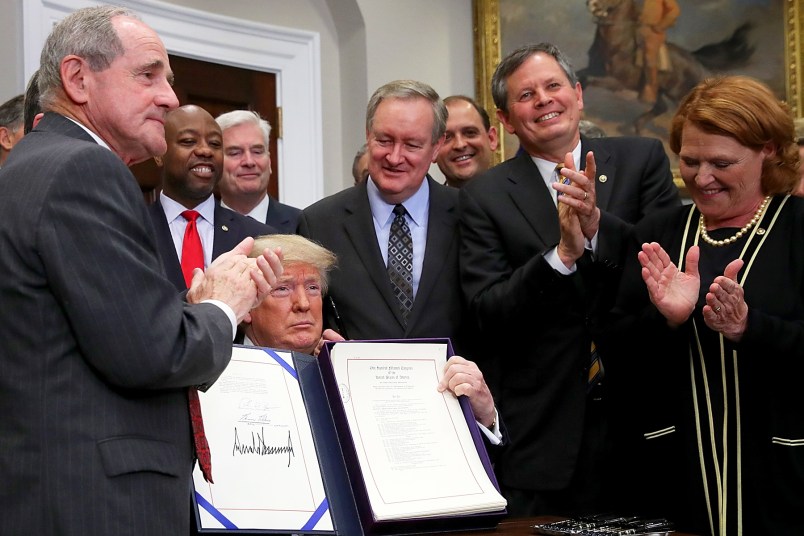One of the main questions to emerge after the collapse of Silicon Valley Bank doesn’t have to do with the lender itself, but with Congress.
In 2018, Congress passed a law rolling back some of the oversight and safety requirements that it had slapped on banks after the Great Financial Crisis. But amid widespread lobbying from smaller banks, including SVB, lawmakers chose to loosen the law as it applied to banks with assets below $250 billion — those lenders, per Congress, were no longer considered “systemically important,” and would receive a lighter touch as a result.
The Federal Reserve, stocked at that point with Trump appointees, then moved to interpret the laws with generosity towards the banks: SVB, for example, would be in a class of banks receiving quarterly liquidity stress tests, instead of monthly, and would be exempt from maintaining a Fed-mandated liquidity coverage ratio.
Whether these changes led to the disaster at SVB remains a matter of discussion.
But many of those involved in the 2018 debate, who argued that mid-sized banks like SVB were not “systemically important” and therefore deserved a lighter touch to do more business, have stirred in recent days to double down on their position.
Randy Quarles, Vice President for Supervision at the Federal Reserve from 2017 to 2021, played a leading role in drafting the Fed’s interpretation of the 2018 deregulation.
“I think there’s interesting questions around supervision and interesting questions about the treatment of uninsured deposits,” Quarles said on Tuesday at an NYU event, adding that he believed the 2018 deregulation “had nothing to do” with the collapse.
Skanda Amarnath, executive director at Employ America, sees the 2018 deregulation as contributing to the SVB failure, and told TPM that Quarles and others were “doing the bidding of the banks.”
“They need to reckon with this being a big failure on a lot of levels,” he added.
In Congress, 16 Democrats and Sen. Angus King (I-ME) joined with Republicans to pass the 2018 bill.
Sen. Mark Warner (D-VA), who was ranking member on the Senate Finance Committee when the bill was being drafted and who supported it, told ABC’s Martha Raddatz this week that he was “proud” to have supported the legislation.
“I do think these midsized banks needed some regulatory relief,” he said.
“You’re going to find out that the [2018] bill had nothing to do with this bank’s failure,” Sen. Jon Tester (D-MT) told The Washington Post, before blaming the bank’s leadership for the failure.
On the GOP side, Sen. Mike Crapo (R-ID) spearheaded the legislation. This week, he told reporters on Capitol Hill that lawmakers should wait before taking any action.
“Before there’s a rush for more regulations, we should make sure that they are actually implementing the ones that are there,” he said, before blaming the collapse on “poor financial risk management strategies.”
The aim of bank regulation, Better Markets CEO Dennis Kelleher told TPM, is partly to ensure that banks are being run in a “safe and sound manner.”
Kelleher argued against the 2018 deregulation as it took place, calling it “dumb, unnecessary, and poorly-timed.”
On the other side of the debate was former Rep. Barney Frank (D-MA), an author of the 2010 bill tightening bank regulations that partly bears his name — Dodd-Frank — and that the 2018 legislation partially rolled back.
In 2015, Frank joined the board of Signature Bank, a lender that regulators shut down over the weekend to stave off contagion created by the collapse of SVB. Frank has received more than $2.4 million from the lender.
In response to a Wall Street Journal report that he had lobbied to ease the restrictions that he authored while in Congress on smaller banks, Frank told the paper that “nobody has shown me any evidence of systemic or other kinds of fraud that would have been prevented” absent the 2018 changes. He reportedly added that lightening regulations “saved smaller banks a lot of paperwork.”
Frank separately told the Financial Times that he took the board job at Signature in part because, after leaving Congress, he “need[s] to make some money.”
“I do it in part by writing. But I also do it by joining boards,” he told the paper. “Logically, I’m asked to join boards on subjects with which I was identified.”
After SVB collapsed, federal regulators stepped in to ensure that the risk of contagion was contained.
That included a determination by the Federal Deposit Insurance Corporation, Treasury, and Fed that the bank’s collapse posed a “systemic risk” to the financial sector — allowing an exception to go through which enabled the FDIC to cover deposits at SVB beyond $250,000.
Kelleher, the Better Markets CEO, suggested that it amounted to an admission that the mid-sized bank was, in fact, systemically important after all.
“It objectively proves that the people opposing this deregulation were right,” Kelleher said.







Isn’t it the same old story? Republicans F it up, the Democrats have to plug it up, regulation wise that is.
Senator Fisher and rep Don Bacon belong in that photo. Worse than useless.
You forgot part III.
After Democrats fix it up, Republicans claim the fix stifles innovation and growth. And must be repealed.
I get it, it’s Montana, but that Suvorov (?) quote comes to mind.
Guys are going to keep poking, until they hit steel.